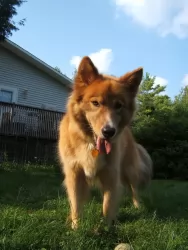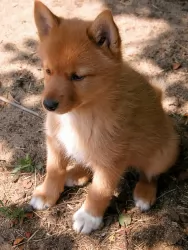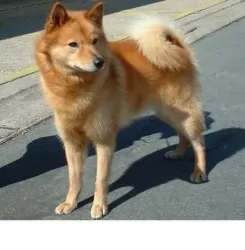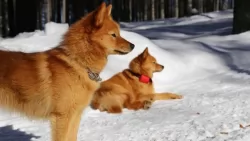 MyDogBreeds
MyDogBreedsKarelo-Finnish Laika is originated from Russia but Australian Cattle Dog is originated from Australia. Both Karelo-Finnish Laika and Australian Cattle Dog are having almost same height. Both Karelo-Finnish Laika and Australian Cattle Dog are having almost same weight. Both Karelo-Finnish Laika and Australian Cattle Dog has same life span. Karelo-Finnish Laika may have more litter size than Australian Cattle Dog. Both Karelo-Finnish Laika and Australian Cattle Dog requires Low maintenance.
 The Karelo Finnish Laika is a Spitz type hunting dog from the Karelia area of Russia.Some people say the dog developed in Sweden. The dog is from a group of ‘Laika’ breeds and has that typical Spitz-type look – the sharpish face, the erect ears and the tail which curls over the back.
The Karelo Finnish Laika is a Spitz type hunting dog from the Karelia area of Russia.Some people say the dog developed in Sweden. The dog is from a group of ‘Laika’ breeds and has that typical Spitz-type look – the sharpish face, the erect ears and the tail which curls over the back.
This attractive dog was developed as a hunting dog, and has a thick, weatherproof coat.The Karelo-Finnish Laika breed developed because people wanted a smaller sized hunting dog that could cope well with the weather, and these Laika dogs matched well.
The breed is ancient – centuries old, and after dying out in numbers during the second world war, the breed was revived when Russians imported Finnish Spitzes from Finland and bred them. The dog is similar to the Finnish Spitz, and in 2006 the Finnish Kennel Club and Russian Kennel Federation included the Karelo-Finnish Laika as a Finnish Spitz breed.
During the 19th century, in the New South Wales, lived a cattle farmer Thomas Hall. He wanted to have a perfect cattle dog so he mixed two breeds: dogs used by stockman with the dingo. The new breed was given an interesting name - Halls Heelers. Heelers was a part of the dog breed because this new breed of the dog inherited the nipping instinct. As time passed, one breed was developing in two breeds: the Australian Cattle Dog and the Australian Stumpy Tail Cattle Dog.
The Australian Cattle dog can be found in two available colours: red and blue. This is how they got their nicknames: Red Heeler and Blue Heeler.
 With his wolf-like appearance, the Karelo Finnish Laika is a sharp, intelligent dog and is the smallest Laika in Russia used for hunting. He stands at about 38–48 cm in height and weighs about 11 - 14 kg.
With his wolf-like appearance, the Karelo Finnish Laika is a sharp, intelligent dog and is the smallest Laika in Russia used for hunting. He stands at about 38–48 cm in height and weighs about 11 - 14 kg.
His coat is a reddish color and the fur is fairly long and coarse with a dense, soft undercoat. He looks like a red fox with his sharp, bright face, his erect ears, black nose and bushy tail which curls over the back.
The Karelo-Finnish Laika is a sweet dog with a quiet character. Whenever you suggest a game for him, he throws his docile side to the wind and becomes highly energetic and animated. He is an active dog and loves nothing more than a game with his human family members.
He is mistrustful of strangers, he tends to bark easily and he is territorial and all these characteristic go towards making him a good watchdog. He is quite prepared to live peacefully alongside other dogs in the home, more so when he has been trained and socialized.
He makes a great friend and pet for families and is more than ready to be loving and loyal to his human family.
The Australian Cattle Dog originally mixed with Australian herding dog that was kept near the cattle to guide them. Medium-sized, with the short coat, this dog is generally easy to groom and maintain. It does require more brushing during the shedding period, but it is still not an everyday need. He is easy to train because he likes challenging games and activities which are. It gets very attached to its owner, and he is always protective of them and their possessions. The most common health problems happen with their ears and eyes, but they are usually very healthy and they have a long life – up to 15 years.
 The Karelo Finnish Laika is such an energetic dog, full of life and he promises to make an affectionate family dog.
The Karelo Finnish Laika is such an energetic dog, full of life and he promises to make an affectionate family dog.
He is a fairly low maintenance dog too and not prone to getting sick easily. Treat this attractive Laika dog like he deserves and you’ll find that he makes a splendid pet.
Children and Australian Cattle Dogs can grow up together in harmony. They will have a loyal and protective companion. After you properly train your dog and teach your child how to play with the dog, you will bring the friendship on the safe side. Some of them will have the instinct to nip at heels, so you should pay attention to this while training your pet.
Special talents: cattle dog, service dog, therapy dog, police dogs, drug detection dogs.
Australian Cattle Dogs can survive cool, hot and temperate conditions. They can live in a shelter outdoors, and they do well living indoors. But, be aware – without enough physical activity, this dog will end up being frustrated and unhappy.
They will absorb every new trick so quick that you will be amazed. They love to learn, and if you start with some good trick you will raise a great friend and maybe a great competitor in fetch, swim, bring-a-stick, or run-the-show dog sports.
 Apart from his good looks, the Karelo-Finnish Laika happens to be a pretty healthy breed and there are no known hereditary health problems with him. Diseases which can affect any dog -
Apart from his good looks, the Karelo-Finnish Laika happens to be a pretty healthy breed and there are no known hereditary health problems with him. Diseases which can affect any dog -
Many large breeds are prone to hip dysplasia. In hip dysplasia, joint problems cause arthritis and pain and eventually lameness. These days, when buying a puppy, people ask breeders about whether the parents were screened for hip dysplasia.
Any dog fed the wrong diet and who isn’t exercised can become overweight. Obesity in dogs is linked to many health problems in dogs. If you’re in doubt about your pet, consult with your vet on the best food for him.
Many dogs are at risk for certain types of cancer, including lymphoma which is cancer of the lymph nodes. When you are brushing your pet, check him for any unusual lumps so that you can catch cancer early.
Dilated cardiomyopathy (DCM) is where the chambers of the heart are stretched out and don't pump blood properly. Sometimes it can go undetected for a while until the dog becomes seriously ill, requiring emergency medical attention. Medications can regulate heart rhythm but there is no cure.
Health Problems: are mostly inherited. You can avoid this by searching for a good breeder that can clear out the hereditary diseases.
The Australian Cattle Dog is one of the breeds that can be born with progressive retinal atrophy. Progressive rod-cone degeneration is a disease that causes the rods and cones in the retina of the eye to degenerate. It might lead to blindness.
The Australian Cattle Dog is one of the rare breeds with recessive piebald alleles. This gene is the reason why they have white colour on their coat. But, unfortunately, this gene can be the reason why congenital hereditary deafness develops.
 The Karelo-Finnish Laika is a most attractive looking dog and his thick, double coat will need to be brushed at least twice a week to keep it free from dust, grass and burrs. He sheds throughout the year so this brushing will keep the loose dog hair under control.
The Karelo-Finnish Laika is a most attractive looking dog and his thick, double coat will need to be brushed at least twice a week to keep it free from dust, grass and burrs. He sheds throughout the year so this brushing will keep the loose dog hair under control.
Watch your Karelo-Finnish Laika’s diet as a lean, mean dog can live longer than one who is overfed. Dogs which are overweight are likely to develop joint problems and heart disease.
The quality of food you feed your pet is hugely important. Popping chocolates and peanuts into his mouth because you love him so much will be toxic for him. Apart from his top quality dry kibble, add in some cooked chicken, rice and vegetables as a tasty treat and mix in a little bit of raw meat also when you can.
Exercise for your Karelo Finnish Laika is a key component to prolonging his life, and he absolutely loves games, walks and action all the way. It will keep him in shape, keep him happy and prolong his life.
Herding dog have a history of the joint diseases. That’s why some of the pet suggest feeding a herding dog with meat like chicken, turkey, beef, lamb and fish. Dry dog food, even premium quality, may not be enough for this energetic dogs and their bone structure. But it depends on the dog. The best advice is to always take an advice from your breeder or your wet.
You won’t be very busy with grooming your Australian cattle dog. You don’t have to take everyday care of it. Occasional brushing will be more than enough. Bath the dog only when you notice odour problem.
The Australian Cattle Dog needs a high level of activity. Like many other herding dog breeds, they love walks, spending time with people, running or doing any athletic sports with them, teaching them tricks since they have above average intelligence. Fetching will be super fun for everyone, agility, competitions or any other challenging activity. They love water and they swim very well so you can take the dog with you to the nearest pool and have a great time.